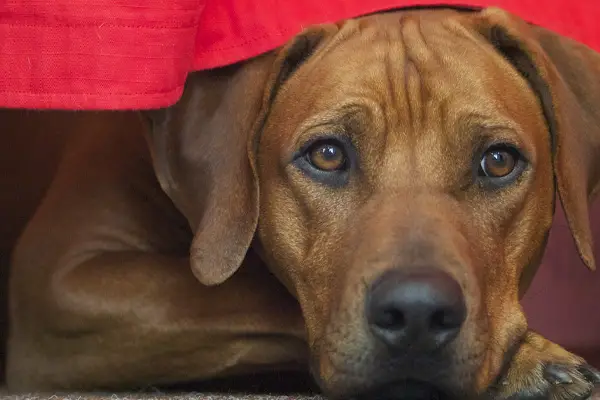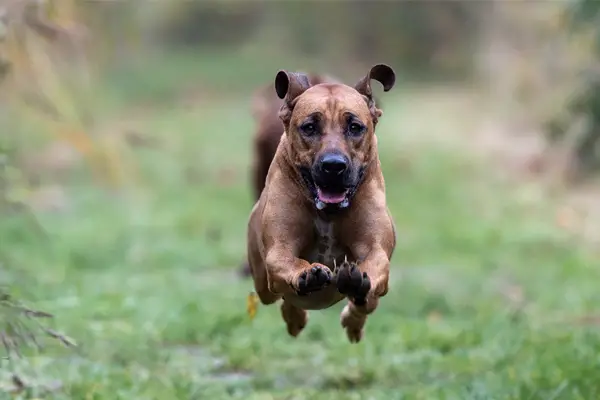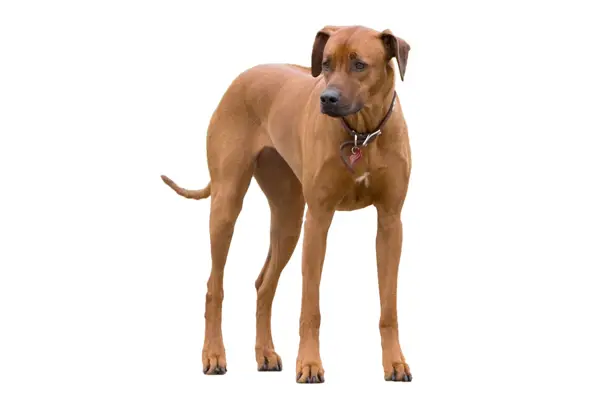The Rhodesian Ridgeback is a medium-sized dog breed known for the line of hair growing in the opposite direction on its back. This is called a ridge, which earned them their name. This dog breed is known to be fast and powerful athletes. They were originally bred as hunting dogs and were developed to have the capability to hold big prey such as bears and lions.
At present, the dog breed is not as often used in hunting as before, but they do well in pointing, retrieving, and other dog sports. They are ideal companions for those who can match their level of athleticism.

Rhodesian Ridgeback Statistics
| Dog Breed Group | Hound |
| Breed Size | Large |
| Height | 25-27 inches (male); 24-26 inches (female) |
| Weight | 85 pounds (male); 70 pounds (female) |
| Lifespan | ~10 years |
Rhodesian Ridgeback Ratings
| Energy level | |
| Exercise needs | |
| Requires attention | |
| Playfulness | |
| Trainability | |
| Shedding | |
| Grooming | |
| Friendly with family | |
| Friendly with kids | |
| Friendly with strangers | |
| Friendly with other dogs | |
| Prey Drive |
Rhodesian Ridgeback History
The Rhodesian Ridgeback is a dog breed of South African descent, which was developed in the 16th century. At that time, Boer farmers needed an all-around hunting dog that can handle extreme temperatures, different terrain-types, survive with little water, knows how to protect, and a great family pet.
So, they crossed a native Khoikhoi dog with European dog breeds such as Great Danes, Mastiffs, and Greyhounds. The cross between these dog breeds resulted in a dog with natural know-how on navigating the African grounds and being able to outsmart the predators.
The farmers also observed that the dog breed turns out to have ridges on their backs, which they believe is what makes them excellent hunting dogs.
In the beginning, the dogs were used for flushing. But when big-game hunting came, they noticed how the dogs were also able to hold lions and other big prey at bay. This is what earned the Rhodesian Ridgeback the name African Lion Hound.
It wasn’t until 1922 when the breed standard was written down, and by 1924, the Rhodesian Ridgeback dog breed was finally accepted by the South African Kennel Union.
It was believed that the dog breed reached the US in 1911. However, their numbers only grew large after World War II, and by 1955, the American Kennel Club finally registered the first of the dog breed.
Now, the dog breed is one of the most popular dog breeds in the US. They make excellent family pets and hunting partners, especially for experienced dog lovers.

Rhodesian Ridgeback Temperament
The American Kennel Club describes the Rhodesian Ridgeback as affectionate, dignified, and even-tempered.
Rhodesian Ridgebacks are believed to be a combination of a sighthound and a scenthound, which are excellent hunting breeds. They need a lot of daily activities. If left bored and not entertained, they can be very destructive and will dig holes on dirt or even your couches.
With the right owner and right care, Rhodesian Ridgebacks would make excellent family pets. They are known to be very gentle with children. However, supervision is needed with toddlers as an excited Rhodesian Ridgeback may accidentally knock them over.
They are affectionate dog breeds and can be protective of family members. They also enjoy the company of other animals; however, they may show dominance with smaller animals or fellow male dogs.
Rhodesian Ridgebacks are also known as natural watchdogs. They may appear timid or shy with a stranger around but note that he always stays alert. They are not barkers, so if you hear your Ridgeback alerting you at something, make sure to listen.
Early socialization and training are needed to keep the good temperaments. This is an independent and confident breed, so expect that it will take a lot of effort to train them. So make sure that you provide consistent leadership and don’t be harsh.
If you’re looking to own a Rhodesian Ridgeback, you need to be attentive as this dog breed needs supervision.
Rhodesian Ridgeback Care Requirements
- Nutrition: For an athletic dog like the Rhodesian Ridgeback, it’s necessary to provide high-quality food. He needs a great balance of protein and fat to offer him enough energy daily. You can also add other essential nutrients such as carbohydrates and fiber. For a Puppy Rhodesian Ridgeback, it’s said that the diet should contain at least 22% of protein and 8% of fat for better development. For an adult, he needs at least 18% of protein and 5% of fat. And for a senior Rhodesian Ridgeback, he needs to be fed less. Derive your essential nutrients from only the best quality ingredients. Quality proteins should come from meat, poultry, and fish, while you can get fat from chicken fat and salmon oil. Add some vegetables, whole grains, and beans as well for sources of carbohydrates. If you’re going for dog food, make sure that it doesn’t contain meat-by-products, fillers, and other harmful chemicals that have very little nutritional value.
- Grooming: Rhodesian Ridgeback is a generally clean dog. He has a smooth coat that sheds seasonally and very minimal. However, weekly brushing is needed to remove dead hair and maintain the healthy state of its coat. Baths can also be done occasionally. As mentioned above, they are not a dirty dog breed. Even with lots of activities, they don’t release that much of an odor. So bathing can depend on how dirty your dog becomes. Ears should be cleaned regularly to prevent ear infection. Don’t wait until bath time to clean them. Nails should be checked and trimmed as well. Long nails will hurt your dog and will make it painful for them to run or walk.
- Exercise: Rhodesian Ridgebacks are strong and athletic dogs, however, they don’t require heavy exercise. Moderate but regular daily exercise should suffice. Once you have provided him long walks or a long duration of playtime, they can be happy to lie on their couch inside your home. In other words, they need to have an outlet to expel that excess energy so he won’t get destructive. If you’re the athletic type, you can take him running, biking, or jogging daily. You can also play fetch or create some activities that you can do together. At least an hour of walking twice a day will also do. Training is another great way for him to spend his energy on. This will also be great if you’re planning to let him participate in dog sport events.
- Health: Rhodesian Ridgebacks are generally healthy; however, like any other dog breeds, they are prone to health diseases. Most significant diseases the Ridgeback has are eye conditions, which include cataracts, entropion, and progressive retinal atrophy. They are also prone to genetic health issues such as degenerative myelopathy, hip dysplasia, dermoid sinus, and hypothyroidism. They are also likely to get gastric torsion or bloating because of their size and deep chest. Some of these diseases have screening tests so you can detect them early. It’s best if you have your dog take one so you can rule them out. However, for diseases that can’t be screened at an earlier stage, you should search for the symptoms and always observe your dog. This way, you can have him checked when symptoms show up.
- Lifespan: The life expectancy of Rhodesian Ridgeback is ~10 years.

Famous Rhodesian Ridgebacks
Penny: A Rhodesian Ridgeback who placed first in the Hound Group at the 2019 AKC National Championship.
Fun Facts About Rhodesian Ridgebacks
- The Rhodesian Ridgeback is a unique South African dog.
- They were developed in Africa as hunting dogs.
- They were also called African Lion Hounds because they help hunt lions in the Savannah.
- Rhodesian Ridgebacks are named for their ridge of hair running along their spine.
- They love to eat.
- Celebrities like Patrick Swayze, Grace Kelly, and Prince Rainier, and Errol Flynn and Blake Griffin love them.
Check Out Other Hound Dog Breeds:
Afghan Hound, American English Coonhounds, American Foxhound, Basenjis, Basset Hound, Beagle, Black and Tan Coonhound, Bloodhound, Bluetick Coonhound, Borzois, Cirnechi dell’Etna, Dachshund, English Foxhound, Grand Basset Griffon Vendeens, Greyhound, Harrier, Ibizan Hound, Icelandic Sheepdogs, Irish Wolfhound, Norwegian Elkhound, Otterhound, Petit Basset Griffon Vendéen, Pharaoh Hounds, Plotts, Portuguese Podengo, Redbone Coonhound, Salukis, Scottish Deerhounds, Sloughis, Treeing Walker Coonhound, Whippet
